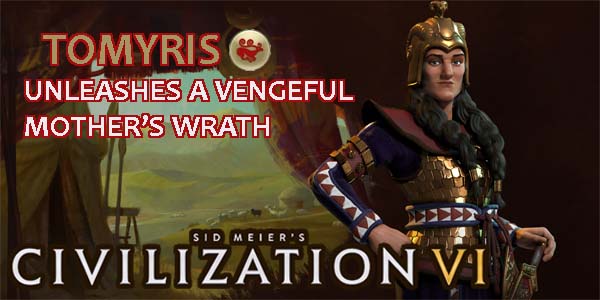
"Scythian" is a term that refers to any of several groups of pastoral nomadic Iranians who inhabited Eurasia in areas north and east of the Caucus Mountains between the 9th century B.C. and the 1st century A.D.. The Scythian peoples lacked a written tradition, and so very little is known about them beyond the archaeological finds and the writings from other cultures (such as the Greeks and Persians) about the Scythians. Even the exact origin of the people is disputed. Were they immigrants from Central Asia or Siberia? Or did their culture arise from combinations of earlier cultures around the Black Sea coast? What is known is that they were among the first groups to become experts in mounted warfare, and at their peak, they controlled a span of territory reaching from Black Sea and stretching as far as the borders of China. Though they lacked written word, archaeological evidence has revealed their culture to be rich in metal-worked art and opulent kurgan tombs.
Various Scythian tribes engaged in frequent raiding and warfare against Middle Eastern empires such as Assyria and Persia. Around 529 B.C. Cyrus the Great attempted to conquer the Scythians. He first sent a proposal of marriage to the Scythian warrior queen Tomyris. According to Greek historians (such as Herodotus), Tomyris rejected the offer, and Cyrus then invaded her land to subjugate her kingdom by force. His army laid a trap for the Scythian army, leaving a poorly-defended camp stocked with wine (which the Scythians were unfamiliar with). When the camp was captured by a Scythian war party, lead by Tomyris' son, the Scythian soldiers became drunk on the spoils of wine, and were overrun and captured by the Persians. Tomyris' son, disgraced by his capture, committed suicide. Upon learning this, Tomyris personally lead an all-out offensive on Cyrus' army, cut off the Persian escape routes, and slaughtered the army. The Persian emperor fell, and his head was returned to the Scythian camp, where Tomyris submerged it in a pool of blood, hollowed out the skull, and used it as her personal wine goblet for the remainder of her life.
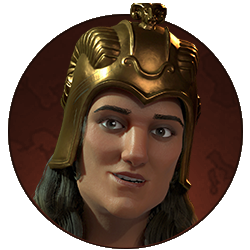
Herodotus' account is the most contemporary, and generally accepted account of Cyrus' death. Other historians, however, have disagreeing accounts. In some accounts, Tomyris was the wife of Cyrus, and murdered him. In yet other accounts, Cyrus was killed in a different battle in which the Scythian Sakas were aiding him against the tribal Derbices people. Regardless, Tomyris is one of the earliest recorded warrior queens, and children in Central Asia are still named after her to this day.
DISCLAIMER:
Civilization VI is still very early in its life-cycle. Strategies for the game (and for specific leaders and civs) may change as Firaxis applies balance patches, introduces new features, or expands the game through DLC or expansion packs, or as the Civ community discovers new strategies. As such, the following strategy guide may change from time to time. I will try to keep it up-to-date, and will make notations whenever changes are made. I'll also post links in the official 2K forums and CivFanatics, where I'll also report any changes made. If possible and practical, I will try to retain the original content of the strategy for posterity.
I welcome any feedback or suggestions that readers wish to offer. Feel free to post on the linked forums, or by posting a comment at the bottom of the page.
This guide is up to date as of the "Austrialian Summer" 2017 patch (ver. 1.0.0.129) actual Summer 2017 patch (ver. 1.0.0.167) (Nubia DLC)
Tomyris is a highly-aggressive leader in Civilization VI. Any neighboring civilization will have to stand the early test of time against Tomyris' massive mounted armies. [More]
cd9d8c09-1718-453e-8d4f-57013c08a842|1|5.0
Tags:Sid Meier's Civilization, Civilization VI, Scythia, Tomyris, People of the Steppe, Killer of Cyrus, Kurgan, Saka Horse Archer, light cavalry, horse, faith, religion, war, unique improvement, ranged mounted unit
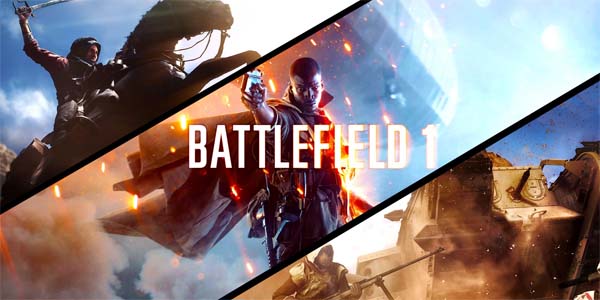
Nobody can make a game about World War I. Trench warfare is too boring. Nothing really happens. There isn't a strong, identifiable villain or good versus evil struggle.
Those are among the many excuses that people made for why all the video games are about World War II, and never about World War I. And then the gaming public and journalists got a glimpse of this:
The teaser trailer for Battlefield 1 was a smash hit.
That teaser trailer was damn good. People were excited. I haven't played a first-person shooter since Call of Duty: World at War, I generally hate online shooters, but even I was excited to try out this game! And other people were hyped about it too.
Now, I never really bought into the idea that World War I was "not video game material". I've long advocated for games to look at all periods of history for inspiration, and World War I is a monumental moment in world history that certainly deserves to be examined by games. The indie market certainly realized this, with games like Valiant Hearts and Verdun. But the big publishers have completely shied away from "The War to End All Wars".
This is a shame. The rapid technological advancements and radically new military tactics that evolved leading up to (and during) the war could be great material to examine in the form of a game. The widescale industrialization of warfare, the complicated politics, and the general fuzziness of the morality of the war are also ripe source material for dramatic storytelling. So it's about time to see this war thrust into the mass market spotlight.
I'd prefer to have seen a strategy game along the lines of Total War; but whatever, I'll give DICE and Battlefield 1 a chance.
UPDATE: 12 MARCH 2018, Better than I gave it credit for:
After having played Activision's Call of Duty: WWII and (especially) EA's Star Wars:
Battlefront II, and having talked about it with friends, I have gained a bit of respect for the successes that Battlefield 1 has been able to accomplish. I've started to like it more in retrospect. Not enough to go back and re-play it or try out any of the expansions (yet), but I do feel that I may have been a bit too harsh on the game in retrospect, especially with regard to its campaign vignettes.
I'm not going to change my original review score, but compared to CoD:WWII and Battlefront II, this game probably deserves a slightly higher grade. So keep that in mind as you read the following review. Of all the big-budget first person shooters that I've played in the past couple years, Battlefield 1
is probably the one that I most enjoyed, and it's the one that I would recommend.
The futile indifference of war
First impressions were actually pretty damned good. I was actually really impressed with Battlefield 1's campaign tutorial. It's basically a guided tour of the game's various core mechanics: shooting at enemy soldiers, capturing victory points, piloting vehicles, and so forth. It does a good job of introducing each of these mechanics and systems by jumping the player around between multiple characters in a large-scale battle.
But what really stuck out to me was how the tutorial transitioned between these different set pieces, and how it handled player death. This tutorial is actually surprisingly merciless and difficult. As you complete one set piece, the game gradually (and subtly) increases the threat until it becomes overwhelming and your character dies (or they just kill you after a timer expires), which allows the game to teleport you to the point of view of another character for the next set piece. The dying character's name and birth / death years are shown on screen during the transition, granting that character with a certain degree of humanization.
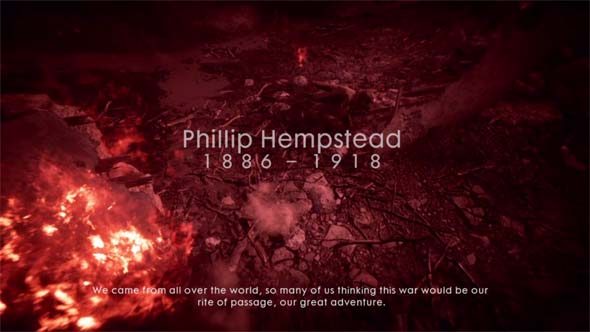
The excellent tutorial emphasizes the indifference and futility of "The War to End All Wars".
Depending on how good you are at the game, you'll go through between half a dozen to a dozen different characters, each with a name and an age. And they all die. The tutorial makes this war look brutal and futile. It even has an almost Dark Souls-like indifference to the player character, killing you without a second thought and forcing you to respawn as another poor, dumb bastard who's about to die for his country, rather than restarting you at a checkpoint until you get it right.
I even wish DICE had gone a bit further by also displaying the character's birth place and maybe even a snippet or two of other biographical trivia. Maybe listing some hobbies, or saying that he was on his high school's varsity football team, or some other little detail like that. DICE settled for just the name and birth / death year, but it's still effective and establishes a very strong running theme throughout the tutorial. The point is a bit undercut by the rapid pacing and by how conventional the actual running and shooting feels. But I still walked out of this tutorial excited by what the rest of the campaign had to offer. [More]
1b3222c5-df25-48fc-8292-199702831456|1|5.0
Tags:Battlefield 1, Battlefield, EA, Electronic Arts, DICE, PC, mouse & keyboard, EA Origin, shooter, online, multiplayer, World War I, war, history, trench warfare, chemical weapon, Harlem Hellfighters, tank, biplane, horse, England, France, Germany, Ottoman Empire, Europe, Argonne Forest, Arabia, Laurence of Arabia, eBay
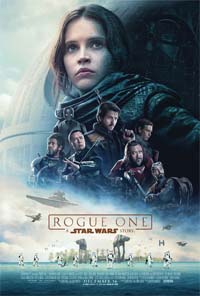
I don't think that Disney's writers take Star Wars' universe very seriously. I'm not talking about story or continuity; I'm talking about the actual, physical space in which the stories take place. They've created a major problem. It's the same problem that frustrated me about The Force Awakens: there is no sense of scale to this universe anymore. I was really hoping that it was just J.J. Abrams and his writing crew being lazy in Force Awakens because his Star Trek movies suffered from the same problem. I had hoped that a new writing crew would improve the material (just like Star Trek Beyond fixed another of my biggest complaints about the reboots of that franchise after J.J. left the helm). But that laziness seems to not only be contagious, but has actually gotten worse in Rogue One. This movie takes something that was only a nagging annoyance in Force Awakens, and blows it up to almost movie-breaking proportions.
In the original Star Wars movies, the time-frames for hyperspace travel was always ambiguous. There were cuts between scenes, and the amount of time that it took for ships to travel was left to the individual viewer's imagination. But now, we see interstellar travel and communications happen instantaneously, in real time! It happens when the fighter crashes on Eado, and the rebel base on Yavin immediately loses contact and sends a squad of fighters to assault the base. It happens again when Rogue One infiltrates the Imperial data warehouse on Scarif, a transmission is intercepted, and a rebel fleet immediately gets rerouted to the planet.
This isn't just bad science; it's also bad writing. The hyperdrive has become a narrative crutch. For the entire second half of the movie, I felt no tension at all because I knew that if the heroes ever got in a jam, a rebel fleet (or reinforcements) could just appear out of nowhere to save the day. This is a prequel, so I already knew how it was going to end. This lazy script contrivance (and all-around dull characters) also made the journey to get there completely uninteresting.
But it goes deeper. How far apart are these places? Is the entire galaxy that accessible?
Basic elements of the overarching Star Wars storyline just completely break down when travel and communication is instantaneous. There's no distinction between the tightly-controlled "core", and the supposedly-lawless "outter rim" planets if a whole fleet of Star Destroyers can literally FTL to any planet in a matter of seconds. There's no need for anyone to make a hard-copy of the Death Star plans to physically transport it if they can transmit the data instantly. And there's no point in pursuing or intercepting ships (such as Leia's Blockade Runner) if hyperspace travel takes the ship to its destination in a mere moment. The empire's holdings become completely indefensible if entire rebel fleets can appear out of nowhere with no warning. Their installations are publicly visible, but the rebels are hidden. The rebels know where all the imperial bases are, and there's nothing stopping them from just jumping to random bases and blowing them up with no recourse from the empire. This universe has lost the believable, lived-in quality and sense of breadth and variety that the original trilogy so expertly executed. The Star Wars universe is broken.
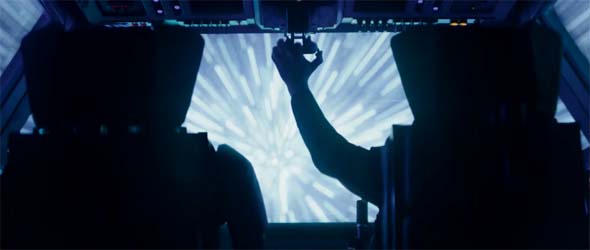
Rogue One shows us instantaneous communication and travel between planets in real time.
"Just turn off your brain and enjoy it", people tell me.
No. I won't turn off my brain. There is no reason why our movies can't be both entertaining and smartly-written. Why aren't we holding our movies to that standard anymore? It's not a tall bar. "Not as bad as the prequels" is not good enough, and I'm not going to pretend that it is when dealing with entries of a series that contains - not one - but two - landmark cinematic masterpieces.
Even if every new movie were as likable as The Force Awakens, these little missteps add up. Each new movie that comes out chips away at the integrity of the franchise (and universe) in which all the movies (including the good ones) exist. We can hand-wave away our complaints about the prequels, or we can ignore them entirely, but we're now at the point at which the original Star Wars trilogy is a minority of the Star Wars film franchise, and it's only getting more diluted. [More]
bed02b8d-cee1-484b-89cb-28dd57548f3e|1|5.0
Tags:Star Wars, Rogue One: A Star Wars Story, Disney, Lucasfilm, prequel, war, espionage, Death Star, Star Destroyer, space, galaxy, faster than light, hyperspace, Grand Moff Tarkin, Darth Vader, uncanny valley, Felicity Jones

It was a long wait to get this DLC on PC and Steam. It originally released back in January on consoles, while we early adopters of the PC version were stuck waiting out in the cold with no clue whether or not we'd ever get the expansion. I wanted to play it, but I was hoping that a PC version would be released because I was skeptical that controlling a shelter full of characters with only an analog stick (and no pause button) would be unweildy. But it finally did get a release on Steam, and was even discounted during the Steam Summer Sale, so there was no way that I was going to pass that up.
The base version of This War of Mine is a fantastic game and ranks up there with Papers, Please, Metal Gear Solid 3, and Ace Combat 4 as one of the best games about war that I've ever played. This War of Mine is a very harsh, brutal, and depressing game. But if you didn't think that it was a depressing enough game to begin with, then wait till you play it with children as playable characters! The expansion adds some new scenarios with child characters as well as a handful of child-specific craftable items, but it's surprisingly skimpy on new content. As far as I can tell, there are no new scavenge locations, ambient events, or neighbor events.

If the game wasn't already difficult and depressing enough, now you have to keep children safe as well.
The trauma of war
Children can be both a burden and a blessing in this game. By default, they can't perform most crafting, they can't shovel away rubble or unlock blocked doors, they can't be sent out to scavenge at night, and they can't do anything to guard or protect the shelter from raids. At the start, they are basically just extra mouths to feed that have the potential to consume more of your valuable medicines and bandages, but they can't contribute directly to your survival. They can also be particularly needy, and their needs can be tough to meet as you struggle just to get the basics like food, water, and an assembly line of crafting stations.
However, it won't stay like this for long, as children can be taught to do many of the same crafting tasks that the adults can do... [More]
7f046816-2d50-4dbe-8958-7c140325ddb6|0|.0
Tags:This War of Mine, This War of Mine: the Little Ones, expansion, DLC, PC, Steam, 11-bit studio, indie gaming, strategy, children, family, war, siege, refugee, civilian, survival, rogue

Recently, I brainstormed the possibility of redesigning Beyond Earth's winstates in order to support cooperative victories. With Civilization VI having been announced last month, I want to take some time to look at some different ways to approach victories in the mainstream Civilization games. Since Civilization III, there have been five victory types that have appeared in every mainstream Civ game:
- the military victory = kill or conquer everyone else
- the science victory = build a space ship to Alpha Centauri
- the culture victory = accumulate the most culture yield (usually through wonders)
- the diplomatic victory = vote for yourself to be leader of the United Nations
- the score victory = if no other victories are met by a certain number of turns, the civ with the highest score wins.
Earlier games had fewer victories (only military and space race), but there have been other victory types as well. Civ III and IV had a victory that simply required the player to occupy a majority of the map's land area and population (which could be achieved via military conquest and/or relatively peaceful expansion). I liked this victory type because it facilitated role-play by allowing me to grow my empire organically without having to feel like I was constantly meta-gaming for one of the other victories - just keep growing by whatever means are necessary or convenient. Civ IV also had a religious victory that required you to convert other players to your religion and then get them to elect you to be Pope or whatever. Civ: Revolution and the board game even included an economic victory in which you must accumulate a certain amount of wealth tokens. This was different than the "economic victory" of Civ V, in which you save up enough money to buy out the alliance of every city state on the turn before a U.N. election.
Civilization IV included a religious victory [LEFT], and the board game includes an economic victory [RIGHT].
These victories are intended to provide a direct path to victory using each of the major fundamental gameplay styles. But are there other methods?... [More]
a7731900-5994-464b-bc32-bb3d6884e093|1|5.0
Tags:Sid Meier's Civilization, Civilization, Civilization V, Civilization VI, victory, military, science, culture, diplomacy, religion, high score, economy, peace, war, cooperation, humanism, humanist, alliance, ideology, space race, United Nations, world wonder, agenda, leaders, Theodore Roosevelt, board game, victory point, Ed Beach, Sean Bean, E3, Settlers of Catan, The Sims 2, Sid Meier's Civilization the Board Game
|

| 12 | | | | | | | 60 | | 11 | | | | | | | 55 | | 10 | | | | | | | 50 | | 09 | | | | | | | 45 | | 08 | | | | | | | 40 | | 07 | | | | | | | 35 | | 06 | | | | | | | 30 | | 05 | | | | | | | 25 | | 04 | | | | | | | 20 | | 03 | | | | | | | 15 | | 02 | | | | | | | 10 | | 01 | | | | | | | 05 |
|